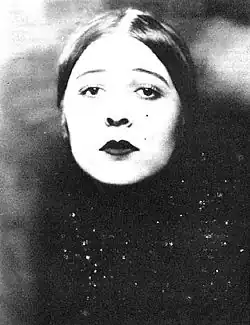Concha Piquer
Concha Piquer | |
|---|---|
 Piquer in 1927 | |
| Background information | |
| Birth name | María de la Concepción Piquer López |
| Also known as | Doña Concha (Mrs Concha), La Gran Señora de la Copla ("The Great Lady of Copla"), |
| Born | 13 December 1906 Valencia, Spain |
| Died | 12 December 1990 (aged 83) Madrid, Spain |
| Genres | |
| Occupation(s) | Singer Actress |
| Instrument | Vocals |
| Years active | 1922–1958 (recordings until 1963) |
| Spouse | Antonio Márquez Serrano (bullfighter) |
María de la Concepción Piquer López (13 December 1906[1] – 12 December 1990),[2] better known as Concha Piquer (and sometimes billed as Conchita Piquer), was a Spanish singer and actress. She was known for her work in the copla form, and she performed her own interpretations of some of the key pieces in the Spanish song tradition, mostly works of the mid-20th century trio of composers Antonio Quintero, Rafael de León y Manuel Quiroga.
Biography
Piquer was born in Valencia, Spain. In 1922, she made her stage debut in New York City at the age of 14, and later appeared with Eddie Cantor, Al Jolson, and Fred and Adele Astaire. On 15 April 1923, she appeared in a short film, From Far Seville, made by Lee de Forest in his Phonofilm sound-on-film process, and shown at the Rivoli Theater in New York City that is considered to be the first sound-integrated film in history.[3][4] This film is now in the Maurice Zouary collection at the U.S. Library of Congress.
Piquer died in Madrid on 12 December 1990.
Discography
Studio albums
(Original titles with English translations)
- Conchita Piquer en la intimidad (1961) — Conchita Piquer in Intimacy
- Conchita Piquer (1962) — (Self-titled: Conchita Piquer)
- Canciones del espectáculo Puente de coplas (1964) — Songs from the Show "Puente de Coplas"
Compilation albums
(Original titles with English translations)
- 10 creaciones ("10 Creations") (1958)
- Sus grandes éxitos ("Her Greatest Hits") (1958)
- Canciones de oro ("Golden Songs") (1986)
- Antología ("Anthology") (1986)
Filmography
| Year | Title | Country | Director | Role | Notes |
|---|---|---|---|---|---|
| 1923 | From Far Seville / De la lejana Sevilla.[5] | Lee De Forest | Herself | Documentary / Short film | |
| 1927 | El negro que tenía el alma blanca / Le danseur de jazz.[6] | Benito Perojo | Emma | Silent film | |
| 1930 | Wine Cellars.[7] | María Luz | |||
| 1934 | Yo canto para ti.[8] | Fernando Roldán | |||
| 1940 | La Dolores. | Florián Rey | Dolores | ||
| 1949 | Filigrana. | Luis Marquina | María Paz Alcolea "Filigrana" | ||
| 1954 | Me casé con una estrella. | Argentina | Luis César Amadori | Gloria María del Carmen Soler | |
| 1975 | Canciones de nuestra vida | Eduardo Manzanos Brochero | Herself | Documentary |
Further reading
- Stephanie Sieburth, Survival Songs: Conchita Piquer's 'Coplas' and Franco's Regime of Terror, Table of Contents, Toronto: University of Toronto Press, 2014, ISBN 9781442644731
References
- ^ "Concha Piquer y su nacimiento". Levante. 21 December 2010. Retrieved 12 May 2021.
- ^ "Concepción Piquer López - Real Academia de la Historia". DBe. Retrieved 18 December 2022.
- ^ "12 mentiras de la historia que nos tragamos sin rechistar (4)". MSN (in European Spanish). Retrieved 2019-02-06.
- ^ EFE (2010-11-03). "La primera película sonora era española". El País (in Spanish). ISSN 1134-6582. Retrieved 2019-02-06.
- ^ Merchán, Lola (2023-12-30). Concha Piquer - DE LA LEJANA SEVILLA (From Far Seville), the first sound film in history. Retrieved 2024-12-07.
- ^ "Movies and series of Concha Piquer". La Vanguardia.
- ^ Películas Mud (2017-10-21). La bodega (1930 Spain) B. Perojo. Retrieved 2024-12-07.
- ^ Aguëras, José; Bedrós, Polita; Nieto, Rafael (1934-12-28). "Yo canto para ti". EFE, Orphea Film. Retrieved 2024-12-07.